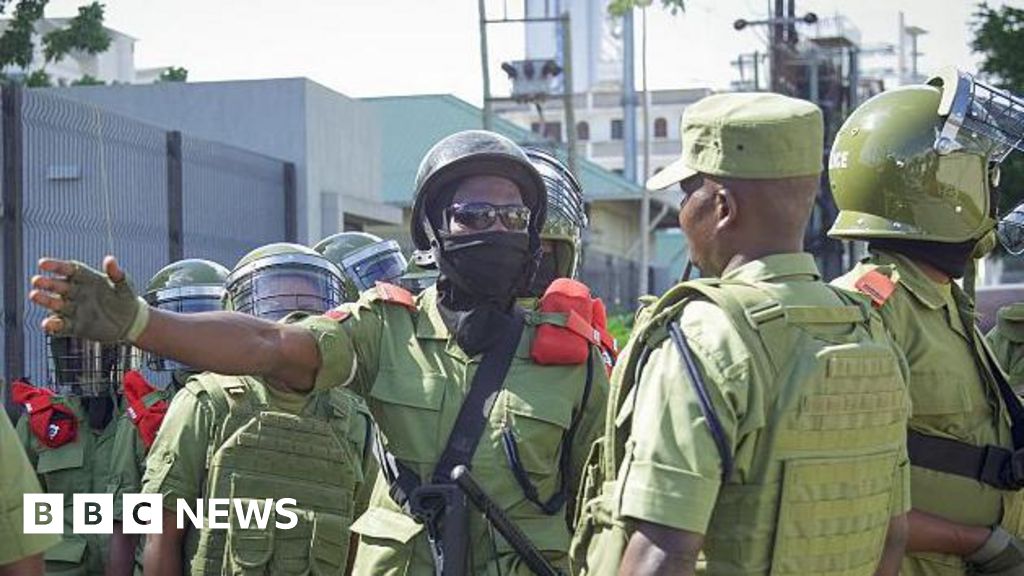- Politics
Critics concerned that US military personnel could face retaliation by Iran and its proxies
时间:2010-12-5 17:23:32 作者:Arts 来源:Crypto 查看: 评论:0内容摘要:It is a move that "still makes perfect sense", she told BBC News NI, and one that would also need other drivers to comply with the required law changes.It is a move that "still makes perfect sense", she told BBC News NI, and one that would also need other drivers to comply with the required law changes.
Gitogo had not heard the command because he was deaf.In 1959, as the British struggled to maintain their grip on Kenya, Ngũgĩ left to study in Uganda. He enrolled at Makerere University, which remains one of Africa's most prestigious universities.

During a writers' conference at Makerere, Ngũgĩ shared the manuscript for his debut novel with revered Nigerian author Chinua Achebe.Achebe forwarded the manuscript to his publisher in the UK and the book, named Weep Not, Child, was released to critical acclaim in 1964. It was the first major English-language novel to be written by an East African.Ngũgĩ swiftly followed up with two more popular novels, A Grain of Wheat and The River Between. In 1972, the UK's Times newspaper said Ngũgĩ, then aged 33, was "accepted as one of Africa's outstanding contemporary writers".

Then came 1977 - a period that marked a huge change in Ngũgĩ's life and career. For starters, this was the year he became Ngũgĩ wa Thiong'o and shed his birth name, James. Ngũgĩ made the change as he wanted a name free of colonial influence.He also dropped English as the primary language for his literature and vowed to only write in his mother tongue, Kikuyu.

He published his last English language novel, Petals of Blood, in 1977.
Ngũgĩ's previous books had been critical of the colonial state, but Petals of Blood attacked the new leaders of independent Kenya, portraying them as an elite class who had betrayed ordinary Kenyans.Mr Williams still maintains that before he left, he never had the effect of different discharge dates explained to him – and that he would never have accepted redundancy on the earlier date had he known an extra two years would have effectively doubled his pension.
Mr Williams' case has similarities to a fight waged by other military veterans over their pensions.Jim Monaghan was involved with the Equality for Veterans Association (EfVA) which also campaigned against pension decisions in the 1970s.
Military rules before April 1975 meant that in most circumstances, servicemen had to serve 22 years to be eligible for an armed forces pension in addition to the state pension.Mr Monaghan left the RAF at the end of 1974, having accrued 14 years' service, including in Singapore and the middle east.
- 最近更新
- 2025-07-07 04:39:07Palestine Action are not terrorists. Israel is
- 2025-07-07 04:39:07Trump got another trade deal. This one could cost you
- 2025-07-07 04:39:07Mbappe returns to training as Real face Salzburg CWC decider – all to know
- 2025-07-07 04:39:07Photos: Search for survivors after Russian drones and missiles hit Kyiv
- 2025-07-07 04:39:07Israel (& the US) vs Iran – what just happened? | Start Here Q&A
- 2025-07-07 04:39:07LA TimesJohn Fogerty on the stories behind 5 of his turning-est, burning-est hits
- 2025-07-07 04:39:07US accuses Harvard of anti-Semitic harassment, threatens to cut all funding
- 2025-07-07 04:39:07One more sizzling hot day for the eastern US before temperatures plunge 30 degrees
- 热门排行
- 2025-07-07 04:39:07Shop at Counter Culture Coffee
- 2025-07-07 04:39:07Thu 3:10 PM EDTMLBNHOU52-34COL19-67
- 2025-07-07 04:39:07The 5-Minute Tomato Salad I Can't Stop Making
- 2025-07-07 04:39:07Groom says ‘annoying’ wedding MC mispronounced bride’s name and made a ‘dirty joke’ t…
- 2025-07-07 04:39:07High-yield savings accounts, money market accounts
- 2025-07-07 04:39:07Fri Jul 4, 11:05 AM EDTNESNBOS43-45WAS36-50
- 2025-07-07 04:39:07Key differences between saving and investing your money
- 2025-07-07 04:39:07NFL contract updates: Latest news on Micah Parsons, Lamar Jackson, T.J. Watt extensio…
- 友情链接
- Next week’s development finance conference in Seville is unlikely to deliver much Trump and Tehran can still make a deal FirstFT: Trump raises prospect of ‘regime change’ in Iran Campaigners launch legal challenge to Thames Water reservoir plan IDF signals it will continue offensive while assessing impact of US raid on nuclear sites Reform UK policy would transfer money directly to poorest 10% Trump’s fateful choice on Iran Anneleen Van Bossuyt suggests measures echoing Donald Trump’s negotiation tactics Travel outside your political tribe? Many are saying no thanks Elevate your dining experience, whether you’re watching Wimbledon, Wicked, or the sun go down Trump tracker: the latest data on US tariffs, trade and economy Keir Starmer’s balancing act on Iran risks political pain at home Trump and Tehran can still make a deal The Israel-Hamas war in maps and charts The 10 most entertaining terraces in London Appreciation would suit Beijing’s global ambitions for the currency The raids attacked research and centrifuge arrays that Tehran has built up over decades The 10 most entertaining terraces in London Japan’s ruling party suffers record low result in Tokyo poll US and Israeli attacks hit key nuclear sites but questions remain over stash of enriched material Self-driving technology on which Elon Musk has staked future of his company debuts in Texas Advent agrees £4.4bn takeover of London-listed Spectris Governments aren’t hearing the calls for aid Real success for Trump in Iran will require de-escalation Trump gambles his presidency as US enters war with Iran ‘ESD’: an investor framework for an era of upheaval Also in this newsletter: How the Iran crisis affects Europe Trump faces backlash from Maga base Advent agrees £4.4bn takeover of London-listed Spectris China needs to take a long-term view and let the renminbi rise
